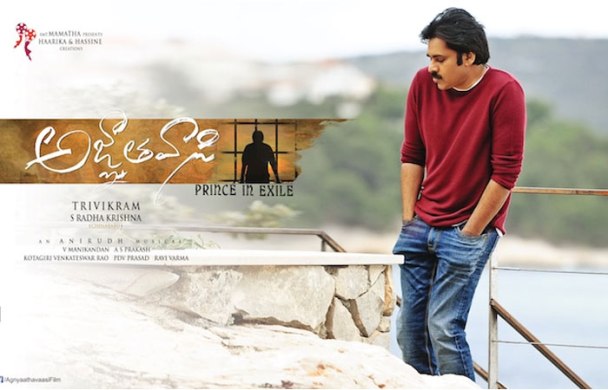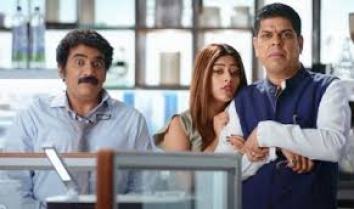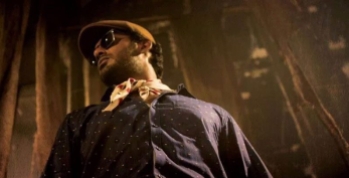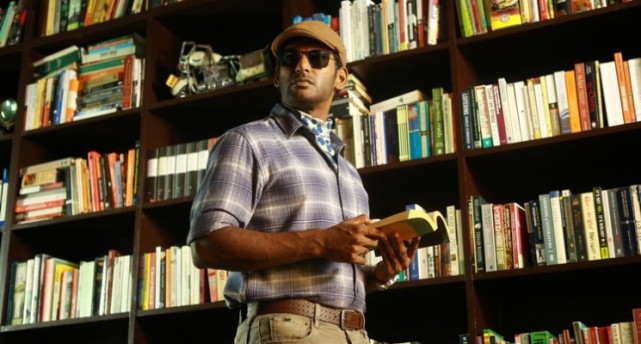
After writing a couple of hits for Telugu cinema, Vakkantham Vamsi has moved into directing his own screenplay with the release of Naa Peru Surya, Naa Illu India. However, despite an excellent opening scene, the film quickly loses momentum and is let down by poor story development and lack-lustre dialogue, most notably between the hero and his estranged father. The bones of the story are there, but Vamsi tries to mix in too much masala in the form of a dodgy crime boss and a rather limp romance, that dilute down what could have been an excellent coming of age movie. It’s still entertaining though, mainly due to an outstanding performance from Allu Arjun, while there are some excellent action and dance sequences that almost make up for the jumbled storyline.
Bunny is Surya, an army officer with more than a few anger management issues. This leads him into trouble, although to be fair the two incidences where he loses his temper in the opening scene are reasonably justified. It’s more that the magnitude of his response is well above what would be considered ‘normal’ and that’s what ends up being his downfall. After an incident with a terrorist leads to his dismissal from the army, his only shot at redemption is to get a letter signed by eminent psychologist Dr Rama Krishna Raju (Arjun Sarja) certifying that Surya has conquered his anger issues. The problem is that Dr Rama is actually Surya’s father, although the two haven’t spoken since Surya walked out when he was 16 years of age. Surya has been raised and supported by his ‘uncle’ Rao Ramesh, who has sponsored his recruitment into the army and manages to persuade his commander, Colonel Sanjay Shrivastav (Boman Irani) to give Surya one last chance.
There is great potential here, but the basic story of Surya’s road to redemption is almost lost behind the subplot of conflict with gangster Challa (R Sarathkumar) his son (Thakur Anoop Singh) and henchmen, Pradeep Rawat and Harish Uthaman. While these scenes are well filmed with great action sequences, Surya’s anger management plans languish in poorly constructed scenes with his father. Where there should have been crackling tension between Surya and Dr Rama there is instead uncomfortable chat that doesn’t come close to developing any kind of relationship between the two men. Granted the premise is that Dr Rama has completely shut Surya out of his life, and Surya will do absolutely anything to get back into his beloved army, but their interactions are so cold and clumsy that they become meaningless. What I wanted was tension and some level of self-realisation from Dr Rama and Surya, but instead there is just Surya’s anger, represented by discordant background music, and a manufactured conflict between Surya and Challa’s son that he needs to ignore if Surya is to go 21 days without fighting.
Oh yes – that’s the other odd plot point. If Surya can demonstrate no angry outbursts in 21 days he will apparently have conquered his problem. This sounds like a google-based plan of anger management and not the evidence-based behavioural therapy expected from a University based psychology professor, but by this point it’s not one of the most far-fetched ideas in the film.
Also problematical is Surya’s romance with Varsha (Anu Emmanuel). Anyone faced with the kind of anger towards them displayed by Surya would start running and not look back, so Varsha’s continued interest in Surya is hard to fathom, especially when she has zero chemistry with Bunny (and how is this even possible?). The romance makes little sense and doesn’t fit into Surya’s self-inflicted isolation shown in earlier scenes when he single-mindedly pursues his goal to be stationed at the border. Anu Emmanuel has little to do other than look glamorous and ‘stand by her man’ at the appropriate point in proceedings. All of which she does competently but it’s another disappointingly pointless heroine role that adds little to the main story. Another wasted character is Surya’s mother, who doesn’t fit at all well into the narrative and fluctuates between apparently not recognising her son and extreme anger at his absence for all these years.
Despite the shortcomings with the screenplay, what does work here is the character of Surya and his struggles to conform. Surya does manage to control his anger but it’s at the expense of his own self-worth and Bunny gets that inner conflict across perfectly. He shows the enthusiasm and fire that drives Surya to be the best soldier he can be, along with Surya’s passion for his country and makes it seem completely natural. Even better are the later scenes where Surya has to come to terms with the compromises he has made to try and meet his 21 days target. What the dialogue doesn’t manage to get across is plain to see on Surya’s face and in his body language. It really is one of the best performances I’ve seen from Allu Arjun and he completely gets under the skin of his character, dour and driven, with only the songs showing his normal cheeky grin. The support cast are all competent and do as much as they can with their limited roles. Thakur Anoop Singh makes the most impact and is impressive in the action scenes, while Vennela Kishore does manage to sneak in some comedy. It’s great to see Arjun Sarja back onscreen but disappointing that he has so little to do here.
The action sequences are excellent and choreographed to make Surya’s one-man army seem plausible, particularly when intercut with scenes of his army training. Naturally no-one can stop Surya when he’s angry, but the action is well put together and Bunny makes it all look effortless. The songs are generally good too, although the first two have little dancing – which surely is a crime in an Allu Arjun film. However just as I thought that, Lover also, Fighter also started with some great moves and awesome tricks with a cap. Bunny interchanges between ultra-classy and gangsta-wannabe in this song, but when it’s right, no-one does stylish like Allu Arjun!
Vakkantham Vamsi tries to include ideas about the evolution of home-grown terrorists but this is overly simplified and has little impact. I was expecting plenty of patriotism and Naa Peru Surya has a surfeit of flag waving and speeches about a United India that feel contrived, but inevitable in any film that mentions the army. If Vamsi had stuck to a straight-forward story about one man’s redemption this would have been an excellent film. However as it stands, with the additions of a gangster storyline, romance and failed family relationships, Naa Peru Surya has too many threads vying for attention and doesn’t do justice to any of them. Worth watching for Bunny, Arjun Sarja, who does a good job with his limited dialogue, and the dance sequences – just don’t expect too much from the story.



















 Despite a stellar cast and a rocking soundtrack, Agynyaathavaasi turns out to be a rather disappointing watch. Trivikram takes an interesting plot and fills it chock full of masala, to the extent that the story of a son’s mission to exact vengeance on his father’s killers becomes lost in the morass of comedy, romance and OTT fight scenes. Nothing too much out of the ordinary for a Telugu film then you might think, but there is simply too much of everything here, making Agynyaathavaasi a clutter of confusion instead of the thrilling action film it could have been.
Despite a stellar cast and a rocking soundtrack, Agynyaathavaasi turns out to be a rather disappointing watch. Trivikram takes an interesting plot and fills it chock full of masala, to the extent that the story of a son’s mission to exact vengeance on his father’s killers becomes lost in the morass of comedy, romance and OTT fight scenes. Nothing too much out of the ordinary for a Telugu film then you might think, but there is simply too much of everything here, making Agynyaathavaasi a clutter of confusion instead of the thrilling action film it could have been.








































